Society of St. Peter the Apostle
-
-
In your city and around the country, this is a joyful time of year. Schools are letting out, and families are gearing up for summer adventures—beach trips, theme parks, fireworks, and camps.

But in the Pope’s mission territories, there’s no such thing as a summer break. Missionaries, priests, bishops, and lay leaders work year-round, often under threat, to help the faithful persevere— especially in places like Ethiopia.
Despite Ethiopia’s rich Christian heritage, believers outside of traditional denominations face harsh persecution. Extremists hunt down missionaries and new converts, often forcing them to flee. In some regions, Christians are attacked by mobs and denied access to basic community resources.
Today, I invite YOU to help bring hope and vital support to missionaries in Ethiopia and other mission territories with a special gift of $100, $350, or $700 to The Pontifical Mission Societies.
Your generosity empowers seminarians like Deacon Deribe Belay, who answered the call to serve the Church despite the risks — including brutality, persecution, and even death.
Deacon Deribe grew up in the Apostolic Vicariate of Harar, where faith was central to family life — but so were hardships. His parish had no priest, so Mass was rare. And being a Catholic in Ethiopia can be dangerous. He was once stoned simply for attending Mass.
After completing seminary in Addis Ababa, he accompanied his bishop on a pastoral visit to a new parish in the Somali region. Hundreds of Catholics had gathered for a joyful church dedication when suddenly, violence erupted.
“As the celebration proceeded, around 50 young Muslim men came up to the parish armed with guns, sticks, and stones,” he recalls. “They came after us, killing some and severely injuring others. I had never witnessed such cruelty.”
Witnessing such violence made Deribe realize how deeply he is called to serve. Now preparing for priestly ordination this summer, he’s determined to return to Ethiopia to walk with his people in their suffering — and bring them Christ’s love.“I have seen with my own eyes Christians being killed just for the crime of being Christian. I have seen families torn apart after the violent murder of their children."Deacon Deribe Belay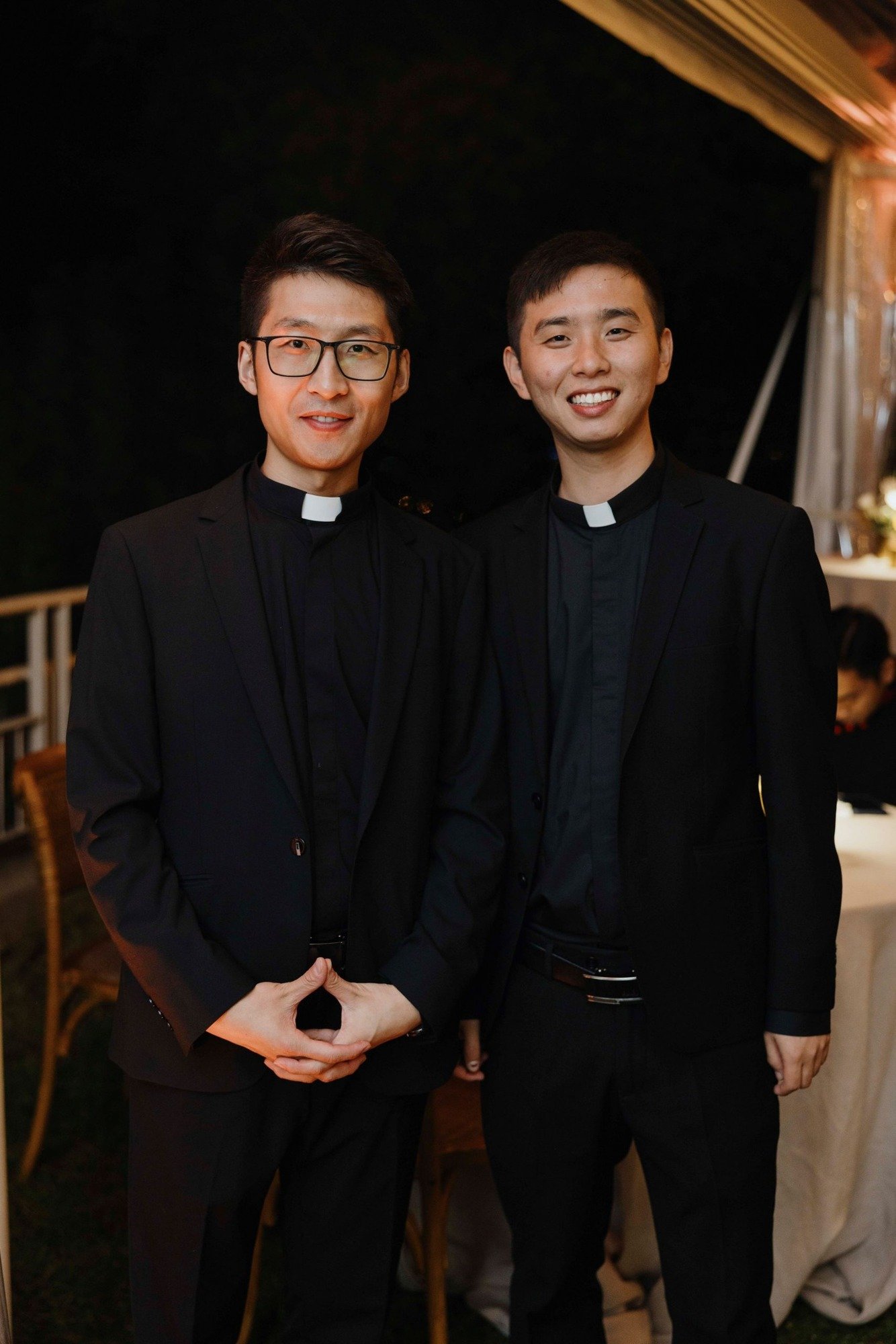
 Will you help him? Your ongoing support of the Pope’s Missions shows your deep commitment to those who serve the Church in the world’s poorest and most persecuted regions.
Will you help him? Your ongoing support of the Pope’s Missions shows your deep commitment to those who serve the Church in the world’s poorest and most persecuted regions.
For Deacon Deribe, priesthood is not about prestige — it’s about compassion, courage, and service. He knows the path ahead is difficult, but he trusts in God. And he trusts in you — the supporters who have made his journey possible.
“If I could speak with the supporters of The Pontifical Mission Societies USA, I would express my heartfelt gratitude,” he says.“Your material and spiritual support allow seminarians like me, from challenging backgrounds, to pursue our education and make a lasting and positive impact on the lives of others.”Across 1,124 mission territories, thousands of young men and women are discerning their call to priesthood or religious life. They are the future of the Church. But they need our help.The Pope calls us to persevere in mission so that Christ's love may reach the most vulnerable. You can help answer that call today by supporting remarkable seminarians like Deacon Deribe.PLEASE PRAY FOR VOCATIONS AND MAKE AN OFFERING TODAY!
-
-
-
 Jeanne BigardIn 1889, mother and daughter — Stephanie and Jeanne Bigard — answered a desperate plea for help from the Missions. The French missionary bishop of Nagasaki, Japan, wrote to the two women asking for help to keep his seminary open because he had run out of the funds necessary to help educate these young men to serve their people as priests. The bishop just did not have the funds to train these young Japanese men whom, he judged, would make excellent priests.
Jeanne BigardIn 1889, mother and daughter — Stephanie and Jeanne Bigard — answered a desperate plea for help from the Missions. The French missionary bishop of Nagasaki, Japan, wrote to the two women asking for help to keep his seminary open because he had run out of the funds necessary to help educate these young men to serve their people as priests. The bishop just did not have the funds to train these young Japanese men whom, he judged, would make excellent priests.
The Bigards came to his assistance and started a small group for this purpose in their native Caen, France. From these humble beginnings emerged the Society of St. Peter Apostle. Within five years of sending their first donation to Japan, the Bigards, and those whom they enlisted to help, were sending funds to seminaries in India, Sri Lanka, Vietnam, Korea, and China.
The goal of the Society of St. Peter Apostle then and now has been to invite individuals to support the education of candidates for the Catholic priesthood in the Developing World and to support the continued formation and training of priests, religious brothers, and sisters in the mission lands.
In its first year, the Society of St. Peter Apostle sent assistance for some 2,700 seminarians in the Missions. Today, some 30,000 major seminarians, mostly in Africa and Asia, receive an annual subsidy of $700 per student.
-
On Open Seas Sisters Travel with the Word
“When the boat arrived at the island, how many children and people came out from those poor simple homes to greet them!” Sister Marissa Maraya recalled. “This was how the Lord brought us to Iling!”
A member of the Missionary Servants of the Blessed Sacrament, Sister Marissa, and her community serve the poor in her native Philippines. These sisters first visited the island of Iling, a one-and-a-half-hour boat ride from Mindoro. When they arrived, they found the poorest of the poor and great suffering. The week before, the villages of the island had been devastated by an epidemic disease which caused death in almost all the families. Many died because there was no doctor, nurse, or treatment available. In fact, the island also had no electricity, safe water, sufficient food, or education opportunities.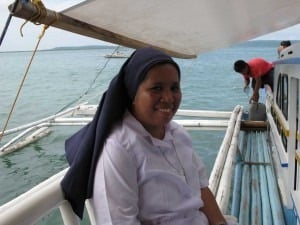 Sister Marissa Maraya
Sister Marissa Maraya
“But our Sisters’ new friends welcomed them with flowers and gratitude, and somebody quickly got some coconut milk for them to drink,” Sister Marissa said. “The people quickly took our Sisters to see their small chapel, and there they went to pray. They thanked the Lord for bringing the Sisters there, and they prayed for all who had died in the recent epidemic.” “At that moment, our Sisters decided to do something for the people here according to our little possibility – but with lots of love,” she remembered.
The sisters returned every week. In a small one-room building near the chapel – both of which were made possible with support from the Society of St. Peter the Apostle – the sisters taught village children basic school subjects while always reminding them of the Lord’s great love. They brought simple medicines and those of the sisters who had some medical training administered routine care. There were also sewing courses for women and young mothers in the area. As time went on, the sisters started a scholarship program, helping to give hundreds of poor children from Iling the opportunity for an education.
Welcome!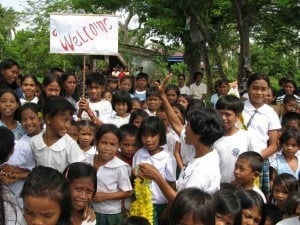 “Poverty remains the problem,” Sister Marissa observed. “But there have been changes, improvements, especially in education.” And the people on this predominantly Catholic island have also changed – they have discovered the beauty and joy of being missionaries themselves. By way of illustration, Sister Marissa shared the story of Nene, a young girl the sisters taught in the school they set up. The first time they met Nene, she asked the sisters to visit her mother who was sick and couldn’t leave the house. They found the woman lying on a bamboo bed, weak and tired. On that first meeting, and every time after that, the sisters encouraged her to offer her prayers and sufferings for missionary work. Before she died, she wrote this message to the sisters: “My sickness forced me to stay in bed the whole day and stopped me from caring for my children and family. For many years, I felt useless. And then your sisters brought me hope and helped me to understand that I can help the mission. During my day, I travel in my thoughts from one place on earth to another, visiting the Missions by accompanying missionaries with my prayers. I who never thought of going out of my little village,” Nene’s mother said, “have reached other continents through prayer.”
“Poverty remains the problem,” Sister Marissa observed. “But there have been changes, improvements, especially in education.” And the people on this predominantly Catholic island have also changed – they have discovered the beauty and joy of being missionaries themselves. By way of illustration, Sister Marissa shared the story of Nene, a young girl the sisters taught in the school they set up. The first time they met Nene, she asked the sisters to visit her mother who was sick and couldn’t leave the house. They found the woman lying on a bamboo bed, weak and tired. On that first meeting, and every time after that, the sisters encouraged her to offer her prayers and sufferings for missionary work. Before she died, she wrote this message to the sisters: “My sickness forced me to stay in bed the whole day and stopped me from caring for my children and family. For many years, I felt useless. And then your sisters brought me hope and helped me to understand that I can help the mission. During my day, I travel in my thoughts from one place on earth to another, visiting the Missions by accompanying missionaries with my prayers. I who never thought of going out of my little village,” Nene’s mother said, “have reached other continents through prayer.”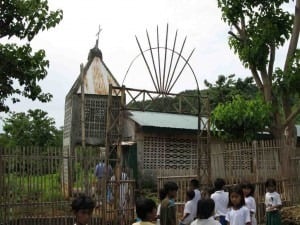 Chapel
Chapel
That first journey on open seas launched new ways for a group of sisters to serve the poor – and started an island community on the journey to being missionaries themselves. Today in the missions, young men and women novices are preparing to serve their people as religious brothers and sisters. Each receives annual help for their formation through the Society of St. Peter Apostle.
Also, throughout Asia, Africa, the Pacific Islands, and remote regions of Latin America, there are seminarians in formation. They have heard the Lord’s call to the priesthood but lack the financial help to complete their seminary studies. Like those preparing for religious life, these seminarians need your help.
From Supermarket to ‘Sign of Hope’
Chanakila Lubasi was once the manager of a local supermarket in his native Zambia. Five years ago, he was ordained a priest. “I want to be a sign of hope that Christ is present in the joyful and sorrowful mysteries of life,” Lubasi said as a seminarian. Reading the Gospels, he was particularly struck by the Lord’s call to “proclaim the ‘Good News’ to the whole world.” “These words,” he explained, “eventually compelled me to go to the seminary.”
Zambia is a country marked by extreme poverty and a place where the HIV/AIDS epidemic has left thousands of orphans. “My role as a priest would be to point to Christ – for strength, for hope,” observed Lubasi. A fellow seminarian Aaron Njobvu agreed. “I am becoming a priest above all to serve,” he says. “I want to be a sign of the love of God for all,” Njobvu stressed the importance of the Eucharist in his service. “In the Eucharist especially the broken connect with Jesus and His love,” he explained. “It will be my privilege to celebrate the Eucharist among my own people.”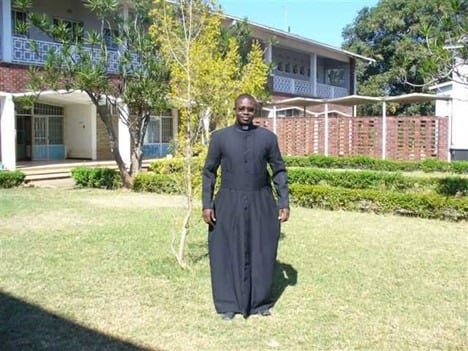 Father Chanakila Lubasi
Father Chanakila Lubasi
Today, young men are preparing for the priesthood at the seminary where Fathers Lubasi and Njobvu studied, St. Dominic’s Major Seminary in Lusaka, Zambia. Each seminarian receives $700 in annual support through the Society of St. Peter Apostle – about $5 a day. Throughout Asia, Africa, the Pacific Islands, and remote regions of Latin America, there are some 30,000 major seminarians in formation. They have heard the Lord’s call to the priesthood but lack the financial help to complete their seminary studies. They need your help – to be “signs of hope,” to “serve” – and to help the poor and most vulnerable in our mission family “feel the hand of the Lord on their shoulders.” Through donations to the Society of St. Peter Apostle, these young men receive that support, and the poor of the Missions are reached with the powerful, hope-filled presence of our Lord.
Pray for them; give generously to support their studies with your donation to the Society of St. Peter Apostle.
-
Father, You will Your Church
to be the sacrament 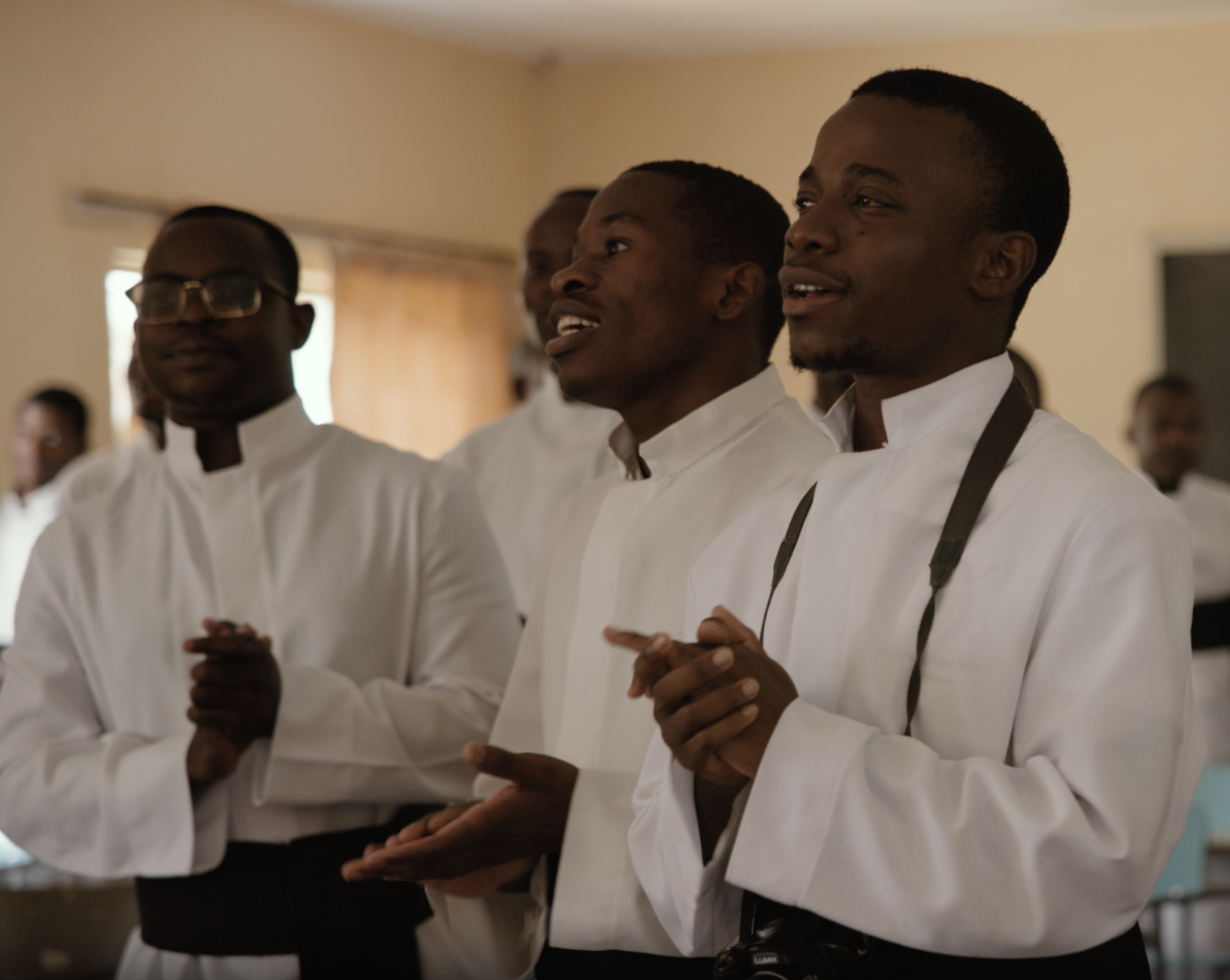 of salvation to all peoples.Make us feel more urgentlythe call to work for the salvationof our human family untilYou have made us one people.Inspire us to continue the savingwork of Christ everywhere untilthe end of the world.Our FatherHail MaryGlory Be…St. Francis Xavier, Pray for us.St. Therese of the Child Jesus,Pray for us.Amen.
of salvation to all peoples.Make us feel more urgentlythe call to work for the salvationof our human family untilYou have made us one people.Inspire us to continue the savingwork of Christ everywhere untilthe end of the world.Our FatherHail MaryGlory Be…St. Francis Xavier, Pray for us.St. Therese of the Child Jesus,Pray for us.Amen.
-